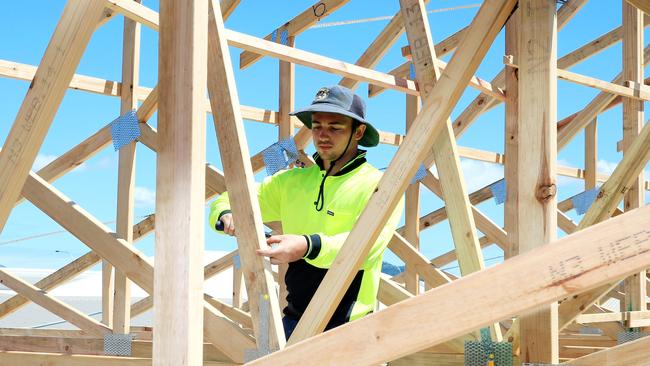Clare O’Neil ignores housing starts crisis to claim 1.2m target is alive
Clare O’Neil says her No.1 focus will be ensuring Labor meets its ‘challenging’ target of building 1.2m homes in five years, despite the lowest annual growth in housing approvals in over a decade.

New Housing Minister Clare O’Neil says her No.1 focus will be ensuring Labor meets its “challenging” target of building 1.2 million homes in five years, despite the ambition being derailed after the lowest annual growth in housing approvals in over a decade.
ABS data released on Tuesday confirmed there were just 162,892 dwellings approved in 2023-24 compared to 177,936 in the year prior. The 2023-24 financial year marked the smallest number of new homes approved since 2011-12.
The housing industry warned it was a “far cry” from the 240,000 new homes the Albanese government wants to see built every year for the next five years, prompting calls for an easing of taxes and regulation, bringing infrastructure and shovel-ready land to market faster, planning reform, and higher density development in suburbs near jobs and transport.
The Business Council of Australia said the housing data was a wake-up call for the federal and state governments, which needed to urgently fix the planning and approval system to ensure more houses could be built.
But Ms O’Neil, who was moved from Home Affairs into the housing portfolio after her performance was repeatedly attacked by the Coalition, remained committed to the government’s “ambitious goal” of building 1.2 million homes by the end of the decade.
“(It) is a challenge, but it’s a challenge we have to meet. This will be hard work, but it’s my No.1 focus as Australia’s new Housing Minister,” Ms O’Neil said.
“The simple fact is that we have a housing shortage. To fix this we need to build more homes, more quickly, in more parts of the country. Unlike the opposition, we’re focused on building, not blocking. We invested more to build homes in this last budget alone than the opposition did in their entire period in office combined.”
The Coalition seized on the data – which showed dwelling approvals were 6.5 per cent lower in June, unwinding the 5.7 per cent increase in May – with opposition housing spokesman Michael Sukkar declaring it “the nail in the coffin for Labor’s fake 1.2 million homes promise”.
“The newly minted Housing Minister – who is responsible for the record levels of migration – clearly hasn’t read her incoming brief when she claimed Labor is still on track to meet its 1.2 million homes promise,” Mr Sukkar said.
“Clare O’Neil should be honest with the Australian people that based on Labor’s own figures they are at least 350,000 homes short of this promise. This means fewer homes will be built in this five-year period than any five-year period over the last 25 years. With record migration under Labor, Clare O’Neil is staring at the problem of her own making in Home Affairs. The Prime Minister must now admit he has broken yet another promise on housing.”
Housing Industry Association senior economist Tom Devitt said new home approvals were down by 18.7 per cent compared to 2021-22 when the Reserve Bank started increasing interest rates, with the less-populous states producing the strongest indicators of a coming recovery.
Total dwelling approvals in 23-24, seasonally adjusted, increased in Western Australia (23.3 per cent) but declined in all other states, led by NSW (-17.8 per cent), Tasmania (-15.1 per cent), South Australia (-9.9 per cent), Queensland (-8 per cent) and Victoria (-6.7 per cent).
“There persists significant uncertainty around the RBA’s battle against inflation. It is up to other policymakers to reduce the cost of construction if Australia were to build sufficient new housing,” Mr Devitt said.
Master Builders Australia chief executive Denita Wawn said high inflation, interest rate instability and building costs being nearly 40 per cent higher than pre-Covid meant people weren’t willing to invest: “There’s a huge demand out there but it’s … not being realised because people are concerned about investing.”




To join the conversation, please log in. Don't have an account? Register
Join the conversation, you are commenting as Logout